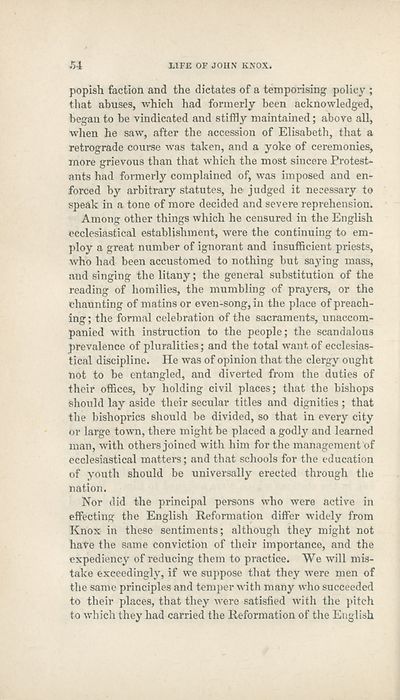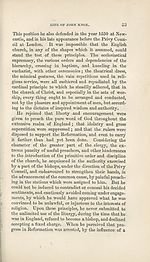Download files
Complete book:
Individual page:
Thumbnail gallery: Grid view | List view

54
LIFE OF JOHN KNOX.
popish faction and the dictates of a temporising policy ;
that abuses, which had formerly been acknowledged,
began to be vindicated and stiffly maintained; above all,
when he saw, after the accession of Elisabeth, that a
retrograde course was taken, and a yoke of ceremonies,
more grievous than that which the most sincere Protest¬
ants had formerly complained of, was imposed and en¬
forced by arbitrary statutes, he judged it necessary to
speak in a tone of more decided and severe reprehension.
Among other things which he censured in the English
ecclesiastical establishment, were the continuing to em¬
ploy a great number of ignorant and insufficient priests,
who had been accustomed to nothing but saying mass,
and singing the litany; the general substitution of the
reading of homilies, the mumbling of prayers, or the
chaunting of matins or even-song, in the place of preach¬
ing ; the formal celebration of the sacraments, unaccom¬
panied with instruction to the people; the scandalous
prevalence of pluralities; and the total want of ecclesias¬
tical discipline. He was of opinion that the clergy ought
not to be entangled, and diverted from the duties of
their offices, by holding civil places; that the bishops
should lay aside their secular titles and dignities ; that
the bishoprics should be divided, so that in every city
or large town, there might be placed a godly and learned
man, with others joined with him for the management of
ecclesiastical matters; and that schools for the education
of youth should be universally erected through the
nation.
Nor did the principal persons who were active in
effecting the English Reformation differ widely from
Knox in these sentiments; although they might not
hate the same conviction of their importance, and the
expediency of reducing them to practice. We will mis¬
take exceedingly, if we suppose that they were men of
the same principles and temper with many who succeeded
to their places, that they were satisfied with the pitch
to which they had carried the Reformation of the English
LIFE OF JOHN KNOX.
popish faction and the dictates of a temporising policy ;
that abuses, which had formerly been acknowledged,
began to be vindicated and stiffly maintained; above all,
when he saw, after the accession of Elisabeth, that a
retrograde course was taken, and a yoke of ceremonies,
more grievous than that which the most sincere Protest¬
ants had formerly complained of, was imposed and en¬
forced by arbitrary statutes, he judged it necessary to
speak in a tone of more decided and severe reprehension.
Among other things which he censured in the English
ecclesiastical establishment, were the continuing to em¬
ploy a great number of ignorant and insufficient priests,
who had been accustomed to nothing but saying mass,
and singing the litany; the general substitution of the
reading of homilies, the mumbling of prayers, or the
chaunting of matins or even-song, in the place of preach¬
ing ; the formal celebration of the sacraments, unaccom¬
panied with instruction to the people; the scandalous
prevalence of pluralities; and the total want of ecclesias¬
tical discipline. He was of opinion that the clergy ought
not to be entangled, and diverted from the duties of
their offices, by holding civil places; that the bishops
should lay aside their secular titles and dignities ; that
the bishoprics should be divided, so that in every city
or large town, there might be placed a godly and learned
man, with others joined with him for the management of
ecclesiastical matters; and that schools for the education
of youth should be universally erected through the
nation.
Nor did the principal persons who were active in
effecting the English Reformation differ widely from
Knox in these sentiments; although they might not
hate the same conviction of their importance, and the
expediency of reducing them to practice. We will mis¬
take exceedingly, if we suppose that they were men of
the same principles and temper with many who succeeded
to their places, that they were satisfied with the pitch
to which they had carried the Reformation of the English
Set display mode to:
![]() Universal Viewer |
Universal Viewer | ![]() Mirador |
Large image | Transcription
Mirador |
Large image | Transcription
| Antiquarian books of Scotland > Scotland/Scots > Life of John Knox ; and, The life of Alexander Henderson > (72) |
|---|
| Permanent URL | https://digital.nls.uk/131833168 |
|---|
| Description | Thousands of printed books from the Antiquarian Books of Scotland collection which dates from 1641 to the 1980s. The collection consists of 14,800 books which were published in Scotland or have a Scottish connection, e.g. through the author, printer or owner. Subjects covered include sport, education, diseases, adventure, occupations, Jacobites, politics and religion. Among the 29 languages represented are English, Gaelic, Italian, French, Russian and Swedish. |
|---|

